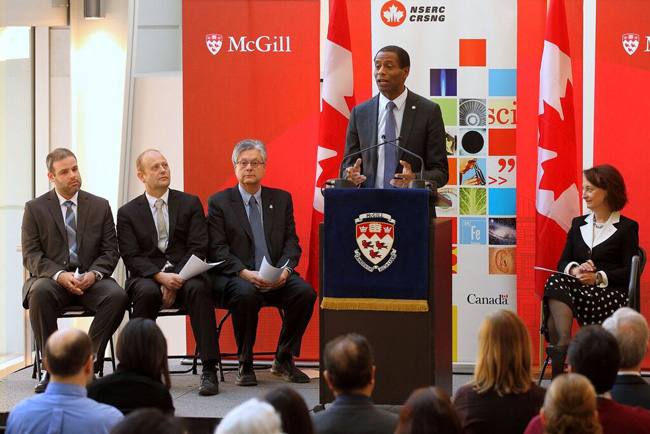
By Kathryn Jezer-Morton
Earlier today, a total of $21.4 million in new grants from NSERC’s Collaborative Research and Training Experience (CREATE) was announced at a press conference held at McGill’s Bellini Building. Of the total, $1.6 million will go to McGill, to fund a six-year project led by Prof. Jake Barralet, who teaches experimental surgery in the Faculties of Medicine and Dentistry, and specializes in bioceramic applications within orthopaedics.
With the help of industry partner Kinova Robotics, among others, this new CREATE project will provide educational training to students in the field of surgical robotics. Prof. Barralet confirmed that nearly 90 students at McGill at both undergraduate and graduate levels will have access to cross-disciplinary training through this new CREATE grant.
The announcement was made by Greg Fergus, Parliamentary Secretary to the Minister of Innovation, Science and Economic Development, on behalf of the Honourable Kirsty Duncan, Minister of Science. Also present at the announcement was Dr. Pierre Charest, Vice-President of Research Grants and Scholarship for NSERC, and Stuart Kozlick, Senior Director of Medical Device Strategy and Innovation at Kinova.
Dr. Charest stated that this latest round of NSERC CREATE grants are putting into practice the goals set out by NSERC 2020, the strategic plan guiding NSERC’s granting work. Among NSERC 2020’s directives is to support the launch of independent research careers for young investigators in academia and in industry, and Dr. Barralet’s project, Innovation at the Cutting Edge, will be part of the realization of that goal.
“Dr. Jake Barralet’s newly funded project at McGill, Innovation at the Cutting Edge, will be a model program of industry partnership in the area of surgical devices,” said Rosie Goldstein, McGill’s Vice-Principal of Research and International Relations, who served as the event’s emcee. “The project’s participants will benefit from unparalleled preparation for career opportunities in healthcare technology.”
“This award provides a unique opportunity for teams of surgeons, scientists, engineers, and business students to work together to improve patient care by applying the process of needs-based clinical innovation,” said Prof. Barralet. The MUHC “provides a fertile environment to expose this multi-disciplinary team to a variety of clinical problems, challenging them to create innovative solutions.”
